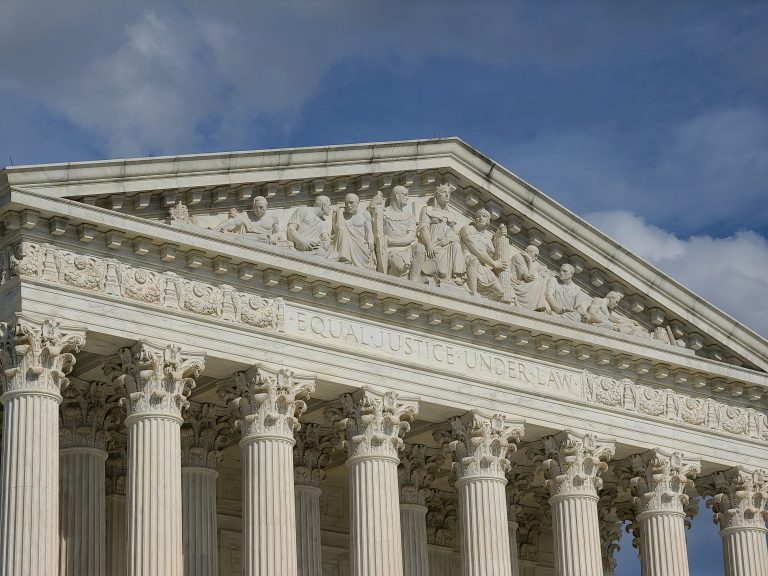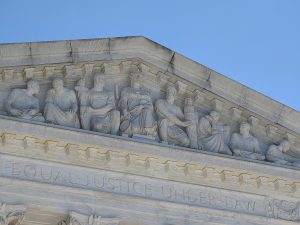The nation’s highest court has agreed to hear another Second Amendment case just a year after it handed down a landmark decision that forged a new test for the constitutionality of gun laws.
On Friday, the Supreme Court granted review in United States v. Rahimi. In February, a Fifth Circuit Court of Appeals panel ruled the prohibition on owning guns while being subject to a domestic violence restraining order is unconstitutional. The Department of Justice (DOJ) appealed that decision, and now the Court will now take up that same question.
The case marks a sustained uptick in the Court’s appetite for Second Amendment cases. While the Court has only considered seven major Second Amendment cases, with one being mooted and another being a unanimous per curiam opinion, three of those seven have come in the last three years. With 2022’s New York State Rifle and Pistol Association v. Bruen creating a new Second Amendment test the Court will likely have reason to take even more gun cases in the future as circuit splits develop over how to properly apply the new test.
Rahimi is not a case brought or backed by gun-rights groups. Instead, it stems from the conviction of a Texas man. Zachary Rahimi admitted to possessing guns in violation of a restraining order taken out against him by the mother of his child that was the result of “family violence.” Police discovered the guns after searching his residence in the aftermath of multiple other crimes Rahimi allegedly committed, including multiple shootings. In court filings, DOJ said he has been accused of taking part in at least five different shootings over the course of six weeks between December 2020 and January 2021. Those incidents ranged from Rahimi shooting at someone he’s also accused of selling Percocet to, shooting at another person he cut off in traffic, and firing a gun into the air at a Whataburger because his friend’s credit card had been declined.
Charges are being pursued in those other incidents that, if Rahimi is convicted, would also lead to the loss of his gun rights. However, the charge at issue in the Supreme Court case is only related to his possession of guns while under the domestic violence restraining order.
On that point, the Fifth Circuit panel found there was insufficient evidence that the restraining order restriction was part of the “historical tradition” of gun regulation, as required under Bruen’s test.
“The Government fails to demonstrate that § 922(g)(8) ‘s restriction of the Second Amendment right fits within our Nation’s historical tradition of firearm regulation. The Government’s proffered analogues falter under one or both of the metrics the Supreme Court articulated in Bruen as the baseline for measuring ‘relevantly similar’ analogues: ‘how and why the regulations burden a law-abiding citizen’s right to armed self-defense,’” Judge Cory T. Wilson wrote for the panel in United States v. Rahimi. “As a result, § 922(g)(8) falls outside the class of firearm regulations countenanced by the Second Amendment.”
The decision reversed the Fifth Circuit’s previous decisions on domestic violence restraining orders where the court had upheld convictions under the same law. The reversal is the result of the Supreme Court rejecting the previous test the court had used to come to that conclusion. In its review under the new test, the panel concluded that, no matter how well-intentioned the gun ban was, it is incompatible with the Second Amendment.
“Doubtless, 18 U.S.C. § 922(g)(8) embodies salutary policy goals meant to protect vulnerable people in our society,” Judge Wilson wrote. “Weighing those policy goals’ merits through the sort of means-end scrutiny our prior precedent indulged, we previously concluded that the societal benefits of § 922(g)(8) outweighed its burden on Rahimi’s Second Amendment rights. But Bruen forecloses any such analysis in favor of a historical analogical inquiry into the scope of the allowable burden on the Second Amendment right. Through that lens, we conclude that § 922(g)(8)’s ban on possession of firearms is an ‘outlier that our ancestors would never have accepted.’ Therefore, the statute is unconstitutional, and Rahimi’s conviction under that statute must be vacated.”
The judges looked at how historical laws had handled similar situations. They examined laws that disarmed groups of people–usually racial minorities–that were perceived as dangerous, laws that banned anyone from “going armed to the terror of the people,” and laws that required specific people who were accused of being dangerous to post a cash “surety” before being allowed to carry in public. But they determined none of those laws were close enough to the modern example to pass muster.
“[O]n substance, the early ‘going armed’ laws that led to weapons forfeiture are not relevantly similar to § 922(g)(8),” Judge Wilson wrote. “First, those laws only disarmed an offender after criminal proceedings and conviction. By contrast, § 922(g)(8) disarms people who have merely been civilly adjudicated to be a threat to another person. Moreover, the ‘going armed’ laws, like the ‘dangerousness’ laws discussed above, appear to have been aimed at curbing terroristic or riotous behavior, i.e., disarming those who had been adjudicated to be a threat to society generally, rather than to identified individuals.”
The judges said “surety” laws came closest to the restraining order law, but were still too different.
“The surety laws required only a civil proceeding, not a criminal conviction,” they said. “The ‘credible threat’ finding required to trigger § 922(g)(8) ‘s prohibition on possession of weapons echoes the showing that was required to justify posting of surety to avoid forfeiture. But that is where the analogy breaks down: As the Government acknowledges, historical surety laws did not prohibit public carry, much less possession of weapons, so long as the offender posted surety.”
Ultimately, they found there weren’t any historical analogues of the type required by Bruen for a total prohibition on gun ownership based on a restraining order. So, they tossed Rahimi’s conviction.
Judge James C. Ho defended the panel’s position in a concurrence. He suggested there are more appropriate means to hold people like Rahimi responsible for their actions. He argued the right to keep and bear arms is “entirely compatible” with the “fundamental role of government in protecting citizens against violence,” even if the Second Amendment precludes gun bans based on restraining orders.
“Our Founders understood that those who commit or threaten violence against innocent law-abiding citizens may be arrested, convicted, and incarcerated,” he wrote. “They knew that arrest and incarceration naturally entails the loss of a wide range of liberties—including the loss of access to arms.”
He argued if the government wants to disarm someone, “it must do so consistent with the fundamental protections that our Constitution affords to those accused of a crime.” He noted that was possible for those who merely threaten violence too. But he said the accused have to be given appropriate protections for their rights.
“Pre-trial detention is expressly contemplated by the Excessive Bail Clause and the Speedy Trial Clause. And it no doubt plays a significant role in protecting innocent citizens against violence,” Judge Ho said. “Our laws also contemplate the incarceration of those who criminally threaten, but have not (yet) committed, violence. After all, to the victim, such actions are not only life-threatening—they’re life-altering.”
The question of who the government can and can’t prohibit from owning guns has been at the core of many challenges in the wake of the Bruen decision. And it’s one that has seen judges offer diametrically opposed opinions on the constitutionality of a given provision.
Earlier this month, the full panel of the Third Circuit ruled a Pennsylvania man’s felony-level conviction for food stamp fraud in the 1990s couldn’t prohibit him from owning guns for life.
“We agree with Range that, despite his false statement conviction, he remains among ‘the people’ protected by the Second Amendment,” Judge Thomas Hardiman wrote for an 11-4 majority in Range v. Attorney General. “And because the Government did not carry its burden of showing that our Nation’s history and tradition of firearm regulation support disarming Range, we will reverse and remand.”
That ruling happened just weeks after a three-judge panel for the Eighth Circuit came to the opposite conclusion in the case of a Minnesota man who is barred from owning guns for previous drug convictions.
“Given these assurances by the Supreme Court, and the history that supports them, we conclude that there is no need for felony-by-felony litigation regarding the constitutionality of § 922(g)(1),” Judge Steven Colloton, a George W. Bush appointee, wrote in his opinion.
That court relied heavily on non-binding dicta the Supreme Court has offered in its Second Amendment rulings, such as 2008’s District of Columbia v. Heller–a message Justice Kavanaugh referenced in his Bruen concurrence.
“Although we do not undertake an exhaustive historical analysis today of the full scope of the Second Amendment,” Justice Antonin Scalia wrote for the majority, “nothing in our opinion should be taken to cast doubt on longstanding prohibitions on the possession of firearms by felons and the mentally ill, or laws forbidding the carrying of firearms in sensitive places such as schools and government buildings, or laws imposing conditions and qualifications on the commercial sale of arms.”
In the federal district courts, there have been a dozen more rulings that have come down on either side of the question over who can and can’t be prohibited from owning guns under Bruen and for how long that prohibition can last. Now, the Supreme Court will take its best shot at trying to iron out some of these disagreements.






